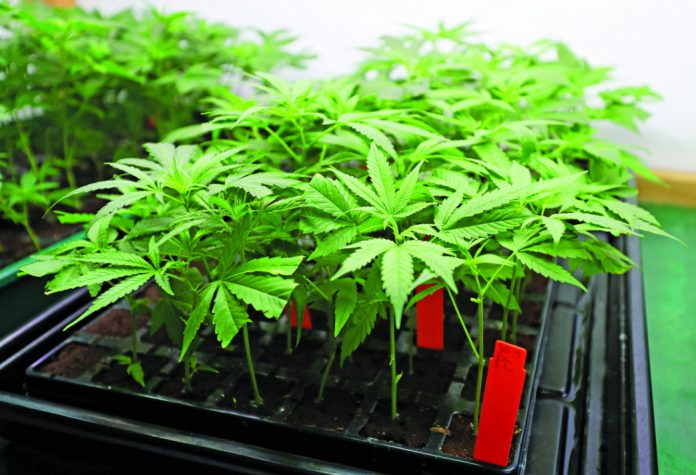Statewide, the business of cannabis is moving forward, but if residents of San Benito County want to see the industry operate in the unincorporated areas of the county, it will be up to them. After the San Benito County Board of Supervisors voted 5-0 on March 5 to pass a cannabis tax resolution for the June 2018 ballot, it now is officially on the ballot.
Approval of the cannabis tax by county voters will be a necessary first step for San Benito County to go forward with the legalization of recreational cannabis cultivation county-wide. At the moment, commercial cannabis operations are not legal in unincorporated San Benito County. However, if voters approve the tax resolution in June, the path towards legalized cannabis would be just one step away.
“About 55 to 56 percent of our voters passed Proposition 64, and if we put this on the June ballot we will have buy-in from our residents, should they say yes or no — not just the five people on the board,” said Supervisor Mark Medina.
The tax will apply to the unincorporated areas of San Benito County, outside of Hollister, which is already many steps ahead in launching dozens of cannabis businesses in the city. County staff, when asked by the Board of Supervisors to draw up a plan, will tax cultivation operations based on per square footage of growing area, along with a tax based on a percentage of gross receipts.
“It’s very important to establish revenue streams, but cannabis won’t solve all of our problems,” said Supervisor Anthony Bothelho. “Support of the measure would send a message that we’re moving forward with a resolution.”
The Board of Supervisors will retain the right to raise and lower tax rates. They will also include an annual increase based on inflation.
Whatever tax the county implements, state taxes will still apply. Today, the state charges $9.25 for every ounce of flower and $2.75 for every ounce of cannabis leaf. Should the cost of cannabis drop, the state still has its bases covered when it comes to tax revenue.
“If an ounce of flower sells for $200 the $9.25 tax results in a 4.63 percent tax,” reads the county report. “If, or maybe when, the price of an ounce of flower drops to $100 an ounce, the same dry weight charge of $9.25 is now a 9.25 percent tax.”
The state also charges a 15 percent excise tax on all cannabis activity, in addition to any existing sales tax.
Whether the taxes are or aren’t implemented will be decided by a simple yes, or no, of the majority of San Benito County voters. The vote essentially will decide the fate of the cannabis industry in the unincorporated areas of the county.
While the Board of Supervisors will have the power to adjust tax rates, the ordinance before the voters will sets guidelines on what the county can charge. The tax per square foot for cultivators will ranch from $3 and $17 and gross receipt taxes on cultivators: 2 percent- 4 percent on distributors, 2.5 percent-4 percent on manufacturers, .5 percent-8 percent on retailers, and 2.5 percent-5 percent on microbusinesses.
The City of Hollister currently charges $7 per square foot and has a 5 percent tax on gross receipts in manufacturing and retail.
During the period of public comment, several county ranchers came to speak in favor of the ordinance.
“It’s never been easy to make a living off our ground, and in the last several years we’ve seen many of our neighbors sell their land to billionaire non-ranchers,” said rancher Lee Scazighini. “We feel that the cannabis industry could be a godsend. With our climate, we could grow some of the best cannabis in the world. I hope you consider this win/win situation.”
Other tax measures
The County Board of Supervisors also approved adding two other tax measures to the June ballot.
Measure, A, the Abandoned Vehicle Abatement Program, would create, if approved by voters, an additional vehicle registration fee of $1 per vehicle and $2 for certain commercial vehicles for 10 years.
This money would be used to cover the costs of removing and disposing of “abandoned, wrecked, dismantled, or inoperative vehicles.”
The third tax/fee measure added to the June ballot in San Benito County is a 50-percent increase in the Transient Occupany Tax, also known as the hotel/motel tax.
Voters will be asked approve, or disapprove increasing the tax from 8 percent to 12 percent for all motels and hotels in unincorporated areas of the county (outside the cities of Hollister and San Juan Bautista). Funds raised by this tax increase could be spent for unrestricted general revenue purposes, but the county specifically identified county services, such as law enforcement, fire, economic development, roads as top priories.










